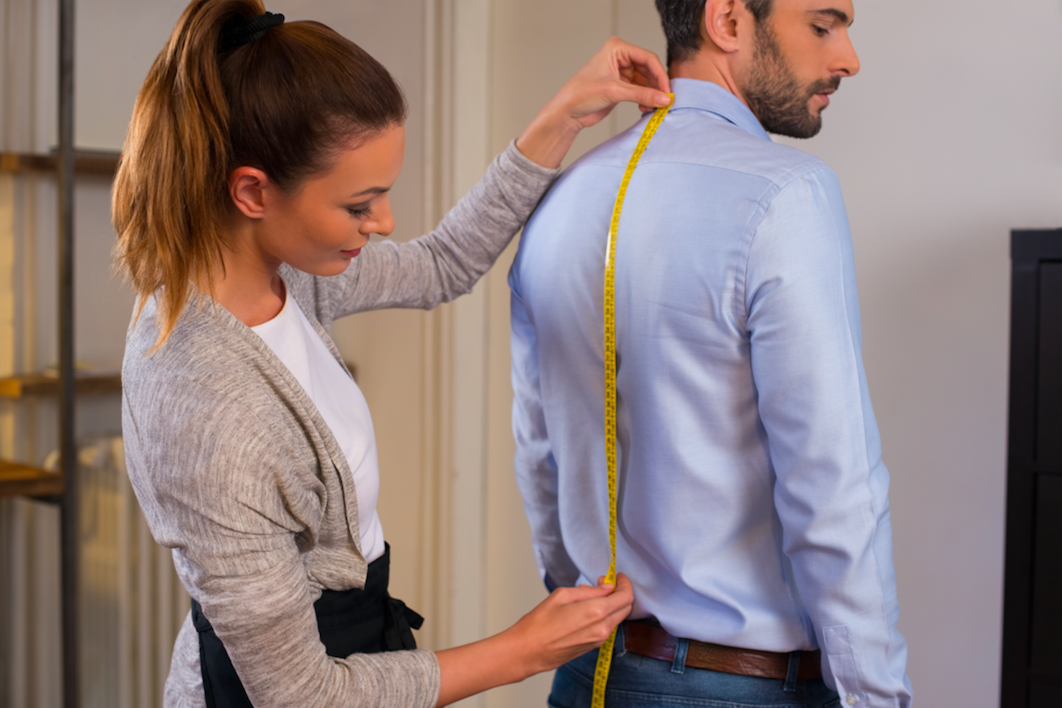Constructing a Man’s Custom Fitted Shirt
Sultans Fine Fabrics is called the King of textiles located in heart of Toronto, carrying a collection of vibrant exquisite versatile fabrics sought after by men and women to design their business suits. The Company also carries over 300 thousand yards of the finest shirting material in a variety of designs and weaves in Egyptian cotton which has been manufactured in Italy. Egyptian cotton fabric has been used for designing the best custom dress shirts. Fabrics made of Egyptian cotton are softer, finer and last longer than any other cotton in the world.
To construct a custom men/women shirt, one must understand a few basics::
- Suitable weaves and thread count.
- Fashionable Styles
- Collar Styles
- Cuffs Styles
- Having accurate measurement.
Suitable weaves and thread count.
The thread count is the number of threads in each square inch and generally speaking, the higher the thread count, the more luxurious, dense and soft the material will feel. The quality of the yarn is also very important in the feel of the end product and the type of machinery used to spin the fabric. These factors play a role in the final feel, texture, durability, and its drapery.
Common weaves:
- Broadcloth Dress Shirt Fabric.
- Twill Dress Shirt Fabric.
- Pinpoint Dress Shirt Fabric.
- Chambray Fabric.
- Denim Shirt Fabric.
- Dobby Dress Shirt Fabric.
- End on End Dress Shirt Fabric.
- Flannel Dress Shirt Fabric
Broadcloth: often referred to as poplin, a tightly woven fabric with a very simple over-under weave and very little sheen, which makes it nice and professional. Broadcloths are great for guys looking for as little texture as possible in their fabrics. They are generally a thinner, lighter fabric
Twill: This is an easily recognizable fabric, because it will show diagonal weave or texture. The diagonal effect can range from very fine, subtle twills to much larger Imperial or Cavalry twills. Twills will almost always have a bit of shine, though the degree can depend on the weave, color, and cotton used.
Pinpoint (also referred to as pinpoint oxford) has the same weave as oxford cloth, although it uses a finer yarn and tighter weave. It is more formal than oxford cloth, but less formal than broadcloth or twill. Pinpoint fabrics are generally not transparent and are slightly heavier and thicker than broad cloths. Because of their heavier construction, pinpoints are fairly durable fabrics. Opt for a twill or broadcloth if you’re looking for a formal shirt.
Chambray: is a plain weave fabric it is made with heavier yarns for a more relaxed or work wear appeal. Generally there will be white threads running in the weft/width direction such that the fabric has an inconsistent color to it. This could be compared to an end-on-end, though chambray is generally much heavier and more appropriate for casual wear than dress.
Denim: is known as the fabric of our jeans, it is a twill fabric. Sturdy, possibly coarser twill is often dyed with indigo. For the most part though, when it comes to denim shirting, you’re mostly going to find much softer, lighter versions of the fabric than what your jeans are made of. Denim shirting can come in many forms but generally have a different color on the inside than the outside.
Dobby: very similar to Jacquard, it can vary widely. Some versions are quite similar to broadcloth in terms of thickness and weight, while others can be thicker or woven to almost look like twill. Many dobby fabrics have stripes woven into them, although some are solid colors. The solid colors tend to have a faint stripe or dotted patterns woven in the same color as the base cloth.
End-on-End: broadcloths are a very popular type of dress shirt fabric with a distinct contrast coloring. Woven with colored thread in the warp and white thread in the weft, it looks like a true solid from a distance, but has more texture when seen from up close. Typically a lighter weight fabric, it’s a great choice for those living in warmer climates.
Flannel: A fall/winter favorite. Flannels are warm, fuzzy fabrics that are most often brushed twill or brushed poplin fabrics. While they’re most regularly 100% cotton, they sometimes can come in cotton/wool, and even cotton/cashmere blends for added warmth. Usually made in thicker weaves, these are decidedly casual fabrics that are great for cold weather.
Why use Egyptian Cotton? Throughout the past three centuries, Egyptian cotton has prevailed with an established reputation of being the "best" cotton in the world, for its softness, strength and superior characteristics, the world's finest cotton having the following characteristics which has set Egyptian cotton apart from other natural fibers. The length of the fiber makes it possible to make the finest of yarns without sacrificing the strength of the yarn making it solid and more resistant to stress. It’s ability to absorb liquids permeating the fabrics deeper, brighter and more resistant colors. It’s softness, pampering its feels like nothing else in the world. This fabric is handpicked which guarantees the highest levels of purity. In addition, it is handpicked leaving the fibers straight and intact unlike mechanical plucking.
All these factors have resulted in the Egyptian cotton being by far the best cotton in the world, and used for manufacturing men’s custom shirts. Fabrics of other staples have also been fabricated like linen, hemp, that have been used to make shirts. However Egyptian cotton has been esteemed the best for custom dress shirts.
The next blog will describe the fashionable styles in men’s custom shirts…Stay tuned

